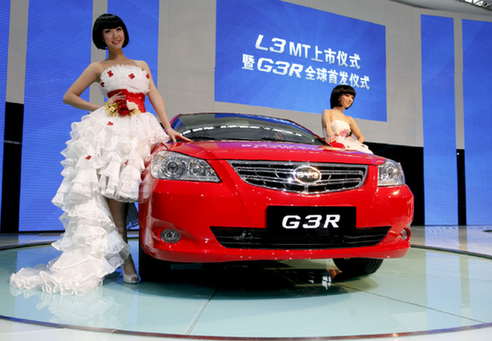Business
BYD’s electric car dream in the US sparks concerns
By Wang Chao (China Daily)
Updated: 2011-01-12 13:35
 |
Large Medium Small |
 |
| BYD, which is among the first to develop batteries for electric cars, sold more than 530,000 vehicles in China last year. |
BEIJING — While electric automobile maker BYD Auto Co, one of Warren Buffett's investments, flexes its muscle in the United States, analysts doubt whether the venture will yield quick and good returns.
The Shenzhen-based BYD, with investments in sectors including IT and new energy, is best known as China’s pioneer of electric vehicle development. It is among the first to develop batteries for electric cars and “leads the fields of electric vehicles with unique technologies”, its website said.
Among Chinese automakers, BYD has also pioneered overseas expansion. In April 2010, it moved its US headquarters from Chicago to Los Angeles for “better logistics and electric vehicle environment” and is working on “green city solutions” in the Californian city of Lancaster, relating to collecting energy through roof solar panels during the day and feeding it to home appliances at night.
“BYD has three main sectors in California — solar power, energy storage, and electrified transportation,” said Paul Lin, a BYD spokesman.
“California has the biggest number of electric vehicles, and its emission regulation is far more stringent than the federal one, so it’s an optimal place to develop our new energy cars.”
Since California pledged to reduce greenhouse gas emissions to 1990 levels by 2020, the state has attracted $9 billion of new energy investment since 2006, 60 percent of the US total.
Los Angeles is now BYD’s human resources and sales center in the US, and its research center in the future, Lin said. The company has hired about 100 locals and plans to hire more.
BYD, which stands for “build your dream”, is one of the top Chinese marques with more than 530,000 vehicles sold in China in 2010.
And it seems its dream of penetrating the US market is progressing. However, it hasn’t turned into reality yet.
The company wanted to introduce the e6, its all-electric car, to the US in 2010, but as it “wanted to make the car roomier for the US customers”, as the company explained to the public, the debut will take place this year.
The e6 is reported to have a range of 320 km a charge, compared with the 225 km of the Nissan Leaf, the fi rst mass produced electric car in the world, which began deliveries in December.
“In 2012 we may begin selling e6 to private users in the US, a er the Chinese market,” Lin said. “But we still don’t have a sales goal yet.” He denied speculation the delays were caused by worries of patent infringement.
Unlike the Leaf, the e6 will adopt a business-to-business strategy and concentrate on public transportation. “I think the commercial car is our entry point,” Lin said.
In early 2010, BYD provided e6s to taxi operators in Shenzhen and is collecting data for evaluation. Experts say the pilot electric cars in Shenzhen rely on multiple batteries to reach its 320 km range, increasing its weight and size.
“The BYD electric car is a little big and clumsy,” said Song Jian, executive vice-president of Tsinghua Automotive Engineering Institute.
“I doubt the range claimed, because from the technical point of view, the quality of its battery is quite mediocre.”
Since BYD began, it has been criticized for copying established designs. “When it developed electric vehicles, there were few models to refer to, so it is a big challenge for BYD,” Song said.
The uncertainty of market response is another big risk. Research and development cost a lot, yet nobody is sure if the vehicles will sell.
However, California has advantages for electric vehicles through generous funds and subsidies, including $5,000 from the state in addition to a federal tax rebate of $7,500.
Stella Li, senior vice-president of BYD, said it plans to provide 50 electric buses in California, initially from China, but eventually to be produced locally. At least one electric bus will arrive in Los Angeles by June for tests.
If the tests prove positive, Los Angeles will sign an agreement with BYD to make the Chinese company a supplier of city buses.
“Since the battery technology is not mature enough, electric vehicles, especially cars, won’t get enough market return to support its electric vehicle development in a short term. For Chinese electric automakers like BYD, it is an ideal market, before the real electric vehicle era comes,” Song said.
Eileen W. Tutt, executive director of California Electric Transportation Coalition, told China Daily that BYD is not ready for the US market.
“It hasn’t passed the safety test yet,” she said, adding that although the company is trying and has applied for federal money, she doesn’t think it has received any.
“Without federal money, it is hard, because it is very expensive to pass the safety requirement.” Many small companies, she said, are receiving grants from the federal government.
Tutt also believes that newcomers such as BYD won’t aff ect the market share of conventional automakers such as Nissan and Ford.
“They only provided more choices for customers; I don’t expect them to take over the whole market, not even in a long run,” Tutt said.
She said that companies such as Telsa and CODA Automotive, both from California, and BYD are interested in the US market, “but they are not mature enough”.
But Lin said BYD doesn’t have major difficulties in California. “The safety test is in good process and hopefully they will have a result before the end of 2011.